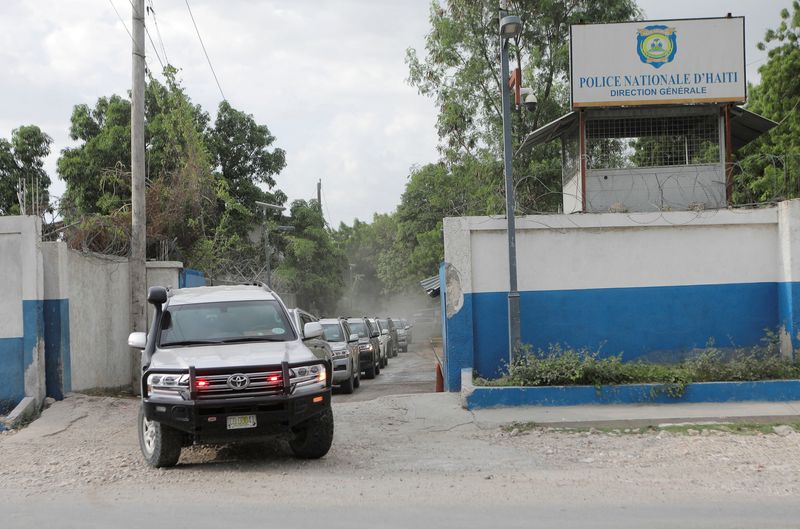By Aaron Ross
NAIROBI (Reuters) -Just 11 days ago, Haitian Prime Minister Ariel Henry and Kenyan President William Ruto signed an agreement that Ruto said would fast-track a long-delayed deployment of Kenyan police officers to tackle spiralling violence in the Caribbean nation.
On Tuesday, the Kenyan government did an about-face, announcing that it was pausing the deployment after Henry resigned overnight and would re-evaluate once a new Haitian government was in place.
The jarring turn of events leaves the future of a multinational mission for Haiti in serious doubt and follows a series of developments that had already called into question the mission's prospects.
Kenya's government first pledged 1,000 officers to lead an international security force last July, but the initiative has been tied up in court challenges ever since, effectively putting on hold a mission to which a half-dozen other countries have now promised to send personnel.
A Kenyan judge ruled in January that the government's plan to send officers was unlawful absent a reciprocal agreement with the host country.
As Kenya's government secured an accord with Henry that it believed addressed the judge's objections, security conditions in Haiti deteriorated.
With Henry out of the country, armed groups who control most of Port-au-Prince besieged the international airport and released thousands of prisoners, deepening concerns within Kenya about a mission many already saw as too dangerous and not in the country's national interests.
"The state seems to be crumbling from within and the security situation is much worse than when Kenya offered to lead the mission," said Murithi Mutiga, the program director for Africa at the International Crisis Group think-tank, before Nairobi announced the pause.
Abraham Korir Sing'Oei, the principal secretary at the foreign affairs ministry, said a future decision on whether to deploy would depend on the situation on the ground.
"There has to be an authority that can be the basis for a police deployment - that enjoys constitutional authority in Haiti," he said.
The United States, which has pledged the lion's share of the mission's funding, said it was confident the deployment would go ahead once Haiti's new leaders were named through a transitional process.
"We think those are steps that will happen, as I said, in the very near future, and that would pave the way for this mission to go forward without delay," State Department spokesperson Matthew Miller told reporters.
'SITTING DUCKS'
The Kenyan deployment faced major obstacles well before Henry resigned. The country's army has previously been sent to countries, including Somalia, but its police officers have never been deployed in such large numbers.
The Kenyan opposition politician who spearheaded the lawsuit against the deployment vowed last week to launch a new challenge. He argues that the unelected Henry did not have the legal authority to enter into such an arrangement for Haiti.
Opiyo Wandayi, the minority leader in the National Assembly, warned last week of immense casualties if the police tried to take on Haiti's heavily-armed groups. Makau Mutua, a prominent law professor, said Kenyan police would be "sitting ducks".
Enock Alumasi Makanga, a former police officer and the national chairman of the Protective and Safety Association of Kenya, told Reuters that Kenyan police lacked the training and equipment to carry out such a mission.
The situation in Haiti "is beyond what our guys can do," he told Reuters.
Kenyan officials have countered that the highly-trained paramilitary officers were well prepared for the mission, which Ruto called a "bigger calling to humanity" motivated by solidarity with a brother nation.
Another major challenge has been financing. A U.N. spokesperson said that as of Monday, less than $11 million - a fraction of the required money - had been deposited into the U.N.'s dedicated trust fund.
In addition, Kenya has asked to be paid the costs of the deployment upfront, but U.N. rules require that funds it administers be used only to reimburse costs already incurred, according to a diplomat based in Nairobi and U.N. officials.
Kenya would therefore need to find a country willing to pay it directly, said the diplomat and U.N. officials who requested anonymity because of the sensitivity of the discussions.
The United States has pledged $300 million to support the mission. The Department of Defense’s contribution of $200 million, which will support logistics, supplies and services to contributing countries, is already approved by Congress, a Pentagon spokesperson said.
President Joe Biden's administration, meanwhile, is working with Congress on approval of $40 million of the $100 million pledged by the State Department, a senior State Department official said, adding the money would not necessarily go to the U.N. trust fund.
It was not clear whether Kenya would be able to access any funding upfront to cover its costs. Kenya's presidency and government spokespeople did not respond to requests for comment.

Foreign governments have been reluctant to participate in the mission, in part due to concerns about the legitimacy of the unelected government of Henry, who took charge after President Jovenel Moïse was assassinated in 2021.
Many Haitian communities and observers are also wary of international interventions after previous U.N. missions left behind a devastating cholera epidemic and sex abuse scandals, for which reparations were never made.